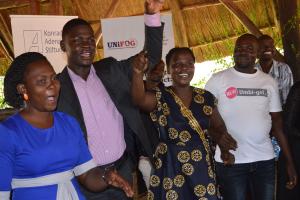PoLA-Lab goes to Iganga, Eastern Uganda - Foundation Office Uganda and South Sudan
Event Reports
On 24th March, the University Forum on Governance (UNIFOG) and the Konrad-Adenauer-Stiftung (KAS) partnered to hold the second POLA-LAB workshop in Iganga, Eastern Uganda. The platform for political leadership advancement (POLA-LAB) aims to mentor effective young political and community leaders by training them in the areas of political and social mobilization, advocacy and political economy analysis.
After five years of proactive engagement with young leaders in Uganda, a common thread was glaringly visible, i.e. the leaders were yearning for more practical and hands-on skills in critical areas such as political and social mobilization, advocacy and political economy analysis. In regard to this stark realization, we have together with our long term partner launched the Political Leadership Advancement Lab (POLA-LAB), an innovative platform aimed at mentoring effective young and emerging leaders in the areas of social mobilization, advocacy and political economy analysis. The project aspires to build leadership which is connected to the led beyond elections and is able to understand development challenges, to mobilize and lead their constituency towards collective participation in finding solutions for social problems. PoLA-LAB session is one-day training that adopts interactive and participant-centered approach to dive into the areas of political and social mobilization, political advocacy and lobbying, as well as political economy analysis.
After the inaugural POLA-LAB workshop was launched on 03 March in Lira district, Northern Uganda, the second series went to Eastern Uganda’s Iganga district were a passionate group of over 25 young political and community leaders from the areas of media, local government, political parties, civil society, universities and business actively participated.
Ayub Kiranda, a programme manager at UNIFOG offered key insights on the subject of political and social mobilization. Mobilization is a key pillar of constructive political engagement because it enables leaders to garner support and necessary resources needed to effectively serve their people. But for mobilization to be more effective, “a leader needs to understand their target group, their common challenges and shared aspirations”, Ayub noted. He then called upon the young leaders to be organized, more proactive and passionate about community service because that is where mobilization is hinged. “Political and social mobilization can only succeed when you as a leader is highly organized and motivated to bring people together to engage constructively for a better cause”
In a second session, Donnas Ojok, KAS programme manager, underlined the importance of advocacy and lobbying in facilitating collective action around a topic of interest. He observed that the strength of citizens is in how they advocate for the things they believe in and critic those they feel are erroneous.
Mr. Ojok also underlined that for any advocacy to be successful, an issue must first be identified, its importance underlined, and key alternative solutions presented. Furthermore, advocacy can take different forms, each of which have its advantages and disadvantages according the political and societal context in which the advocacy takes place. For instance, he called upon participants to always adopt a more dialogical advocacy approaches rather than engaging in violent demonstrations which are destructive and seldom offer practical and feasible solutions to challenges.
In a final session, Adventino Banjwa, PhD researcher at the Makerere Institute of Social Research introduced the participants to political economy analysis, a powerful tool in development work. In order to take action or create effective change on any political or social issue, the context of the issue must first be understood within a political economy framework. Political Economy Analysis, Banjwa argued is a key pillar for understanding how to engage the various stakeholders, mobilize them to take action and create the right incentives for community members to come together collective action challenges.
The engaging discussions among participants throughout the workshop reflected the importance of the three key focus areas of POLA-LAB in achieving meaningful change as a young community leader: political and social mobilization, advocacy, and political economy analysis. One participant, for instance noted that, “Now I know politics is more than elections. It is embedded in my life and daily work as a community development officer”.




